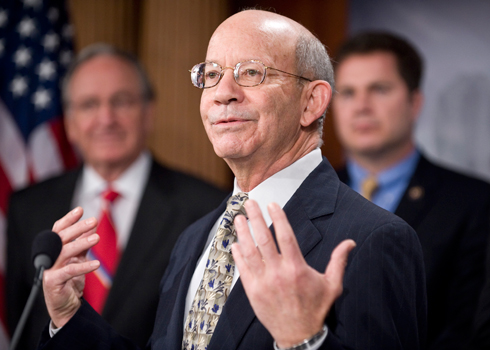Here’s another change Dems are considering to the individual mandate in the health care law in the wake of Tuesday’s federal court decision.
Rep. Peter Defazio (D-OR) proposes that people be allowed to opt out of the insurance mandate altogether — but if they do, they will not be allowed to free-ride on the new health care system.
Under his plan, a person opting out “must file an ‘affidavit of personal responsibility’ with the state exchange. Such a filing will waive their rights to: 1) Enroll in a health insurance exchange; 2) Enroll in Medicaid if otherwise made eligible; and 3) Discharge health care related debt under Chapter 7 bankruptcy law,” DeFazio wrote in a letter to colleagues Tuesday.
Under his plan, if a person wants back into the system, they’d need to buy insurance on their own, out of pocket, for five years. The idea here, and with other, similar plans, is to moot one of the constitutional complaints about the mandate — that it penalizes “inactivity.”
The question is whether tweaks like this will create “adverse selection” in the insurance market. That’s what would happen if the people who opt out are broadly healthier than the people who don’t, and it would cause premiums to rise considerably.
You can read DeFazio’s entire letter below.
Dear Colleague:
Yesterday’s Pensacola District Court decision to strike down the entire health care reform law was unnecessary. Congress can quickly resolve the issues of constitutionality and the limits of the federal government by reforming the individual mandate with an opt-out clause that allows for full personal responsibility. I believe buying insurance should be a choice, not a matter of federal coercion. But with that choice comes responsibility.
I will soon be introducing the Personal Responsibility in Health Care Insurance Act that creates an opt-out option to the individual health insurance mandate. In making that choice to opt out, Americans should accept the full costs of their own health care, and not be a burden on taxpayers, medical providers, or other Americans who have purchased insurance. In 2008, the uninsured received approximately $45 billion worth of uncompensated care from hospitals, doctors, and other providers, after out-of-pocket payments and government and charity program contributions. Oregon families pay an extra $1400 a year ($1,100 nationally) on higher insurance premiums to cover those who do not have insurance. This is effectively a hidden tax on families and businesses.
Under my proposal, anyone required to purchase health insurance and who does not already qualify for an exemption (current law contains religious and low income exemptions) can opt-out of the mandate.To do so they must file an “affidavit of personal responsibility” with the state exchange. Such a filing will waive their rights to:
1) Enroll in a health insurance exchange;
2) Enroll in Medicaid if otherwise made eligible; and
3) Discharge health care related debt under Chapter 7 bankruptcy law.These rights would be restored after the person purchases the minimum level of insurance for at least 5 years without subsides or the benefits of the exchange. This will prevent adverse selection, the ability to buy insurance only when you need it.
In the Florida v. HHS ruling yesterday, Judge Vinson opened the door to this fix in Footnote 14:
The individual mandate differs from the regulations in Wickard and Raich, for example,
in that the individuals being regulated in those cases were engaged in an activity (regardless of whether it could readily be deemed interstate commerce in itself) andeach had the choice to discontinue that activity and avoid penalty. See, e.g., Wickard v.
Filburn, 317 U.S. 111, 130, 63 S. Ct. 82, 87 L. Ed. 122(1942) (noting Congress “gave the
farmer a choice” of several options under the statute). Here, people have no choice but
to buy insurance or be penalized. (emphasis added)Secondly, Judge Vinson argues that the individual mandate cannot stretch the Commerce Clause to the point where it has no “outer limits”. Putting aside the arguments for or against this test of the Commerce Clause, adding a personally responsibility opt-out clause provides a direct link to commercial activity (i.e. the exchanges, Medicaid, and bankruptcy) and thus ensures the constitutionality of the health care reform law.
Join me in the common-sense fix that resolves not only the constitutional questions of the individual mandate, but also provides a workable remedy for those who do not want more federal intrusion into their lives. If they waive their right to the federal health care backstop, then they alone are burdened with their future healthcare costs.
Peter DeFazio
Member of Congress










